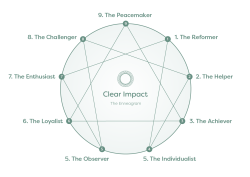



We recently became aware of major online furor regarding words and actions by Tony Robbins, the very well-known motivational speaker and workshop leader, related to a San Jose workshop on March 15, 2018. His initial actions caused much anger, particularly from supporters of the #MeToo movement. His response to the initial uproar made things worse. We’d like to explore and deconstruct this issue through the lens of the Enneagram. I (Joel) will be writing this in my own voice, because I apparently share the same Enneagram Type as Mr. Robbins, and the patterns that seem to have gotten in his way are all too familiar to me.
First, what happened? Regarding the #MeToo movement he said, “What you’re seeing is people making themselves significant by making somebody else wrong.” A woman stood up to him, and he responded by verbally and physically intimidating her. In that workshop he also said, “If you use the #MeToo Movement to try to get significance and certainty by attacking and destroying someone else, you haven’t grown an ounce. All you’ve done is basically use a drug called significance to make yourself feel good.” He later told a story, “I was with someone the other day, very famous man, very powerful man, he’s saying how stressed he is because he interviewed three people that day. One was a woman, two were men. The woman was better qualified but she was very attractive, and he knew, ‘I can’t have her around, because it’s too big of a risk’ and he hired someone else. I’ve had a dozen men tell me this.” He never identified what the “risk” was. There were many online comments that Mr. Robbins’ apparently missed an opportunity, in talking to this man, to promote gender appropriate values.
He then offered a Facebook apology. Sort of. While he said “My comments failed to reflect the respect I have for everything…the #MeToo movement has achieved” he went on to say, “For 40 years I’ve encouraged people to grow into the men and women they dream to be…My own [life] started with a childhood marked by abuse. I am humbled that others have looked to the path I have taken for decades since as lessons in their own journey.” While he offered more words of apology, including the need to ensure that his words and actions live up to his ideals, he didn’t address the verbal or physical intimidation, nor directly say exactly what he had said or done that was not up to his ideals, or why. In response someone Tweeted that “This @TonyRobbins statement is absurd. It’s overproduced, comes across as disingenuous, and is used to promote his brand rather than offer contrition.”
The Enneagram has been our self-awareness model of choice for well over two decades, and we are both Certified Enneagram Teachers through the Enneagram Institute. We have some Enneagram information on our website and will be adding more over time. The Enneagram describes nine distinct sets of values and filters through which we see the world. While we each can have aspects of many of these types, at the core we are one Enneagram type. Our Enneagram Type likely forms somewhere between birth and two years. Once it forms it is stable and is a core driver of our life strategy: how we want to feel, and how we believe we need to think and act in order to have that experience. It maps our strengths and our major blind spots (or shadow). Each Enneagram Type has a unique path of development or focus of attention needed in order to be a more effective and fulfilled human being.
There are Levels of Freedom for each Enneagram Type: High Performance at the upper end, then Average, with Acute/Chronic Stress at the lower end. At High Performance we are more present and aware, and our lives are more an expression of our most important values and principles. Our relationships are generally collaborative and effective, and we are more satisfied and fulfilled. At the Average Level we have habitual patterns of thinking and acting that are much less effective. Our relationships become more contentious as we become more and more self-oriented, feeling that we need to get our needs met at the expense of others. We may find ourselves “stuck” where whatever we do makes things worse. At Acute/Chronic Stress our lives break down, often to tragic proportions.
We like to say that the Enneagram accounts of most of how we screw up, as well as our gifts – when I look back and wince, or feel shame or remorse for things I’ve done, they tend to have a strong echo of the negative aspects of Enneagram Three. The negative aspects of our type show up when we are less than fully present and self-aware. This is part of why understanding our Enneagram Type is so important.
It is presumptuous to assume we know the Enneagram Type of anyone who has not personally identified it. Yet an online search finds that Tony Robbins is always identified as Enneagram Three, including by the Enneagram Institute. Reviewing their Enneagram Three description it is easy to see why. They describe the Enneagram Three as The Achiever, the Success-Oriented, Pragmatic Type. These qualities are characteristic of his workshops and how he comes across. Higher qualities of Enneagram Three are being self-assured, attractive, charismatic, motivational, charming, driven and high achieving, also characteristic of Mr. Robbins. Threes are often pictures of success, and project an atmosphere of cool confidence and competence. Yet there is also a Shadow or “dark side” of every type.
As mentioned I (Joel) am also an Enneagram Three, and very familiar with the Shadow of my type. I see this Shadow reflected in much of the San Jose furor and its aftermath. At the same time, I also understand that it’s absolutely unfair to make any assumptions about what is going on within Mr. Robbins on the basis of limited news reports. I do not know his perspective on this issue, other than what he posted on his Facebook site. So I am writing this post on limited information, and making assumptions based on that limited information, which is of course unfair. So, just to be clear, I’m making assumptions about Mr. Robbins’ Enneagram type, as well as what is going on within him. This is frequently done with highly public figures, but it doesn’t mean that those assumptions are valid. All I can do is take this isolated episode and comment on how it relates to the shadow of Enneagram Three.
Here are some aspects of that:
The drive for success is also a reaction to core inner fear of unworthiness and accompanying shame. This can make it very hard as Threes to admit when our actions are self-oriented, unconscious, driven by negative motivations, competitive, uncaring, etc. We instead try to “perfume the pig,” scramble to cover up our mistakes, reframe them as learning opportunities, anything to avoid us directly touching the shame that can drive our patterns. In Mr. Robbins’ Facebook “apology” he seems to have difficulty admitting negative drives or impulses.
Each type has an emotional energy. The emotional energy of Enneagram Three is Vanity. Vanity is constantly looking to see how we are being seen by others, because we frantically look for self-validation in the eyes of others when we cannot find it internally. I experience this as carrying around an “imaginary audience” who are looking at what I’m doing (and of course hopefully admiring it). There’s the line from the movie Jerry Maguire that’s something like, “Well, enough talking about me. Let’s talk about you. How do you see me?” Even when Mr. Robbins issues an apology he uses the opportunity to promote himself and celebrate his own accomplishments.
Each type has a habit of mind. The habit of mind of Enneagram Three is Deceit. Deceit for a low average Three can be conscious deceit, the classic used car salesman. For most Threes it’s subtler. It’s that we create an image of how we want to see ourselves, and then we believe our own press clippings. The undercurrent of shame has us need to see ourselves in a positive light, and we fool ourselves into thinking this is who we really are. With the San Jose incident, nowhere in Mr. Robbins’ “apology” is there an actual acknowledgement of anything that would tarnish his image of how he sees himself. Nothing about any negative patterns, shadow, or motivations. Certainly nothing about bullying or physical intimidation.
Enneagram Threes tend to habitually self-promote. I was once talking to an executive coaching client and using a story of someone else that I coach. I said something like, “There’s a CEO I coach who….” My self-aware client said, “Oh, is that your Enneagram Three pattern, telling me that it’s a CEO because that makes you look special? Does that add anything to the story?” I laughed and said, “Busted!” In San Jose, Mr. Robbins felt the need to tell a story of someone he talked to who is “a very famous man, very powerful man.” The same question that my client asked: what does that add to the value of the story?
As mentioned at the beginning, each Enneagram Type also has the potential for profound gifts, and Mr. Robbins’ life is clearly an expression of these. He has made great and positive differences for many people. He is charismatic, persuasive, and highly motivating. We know many people who are attracted to his workshops and hold him as a powerful teacher. Nothing in this blog post is intended to diminish any of that. At the same time, every Enneagram Type also has Shadow aspects that we need to constantly monitor in order to optimize who we are and how we’re impacting others. I try to self-monitor my potentially negative Enneagram Three aspects throughout the day. Despite actively working with the Enneagram for 25 years, I can still easily fall into the negative traps, as my partner can well attest! Perhaps Mr. Robbins would benefit from monitoring those same potentially negative patterns in order to provide an even greater service to the world.
